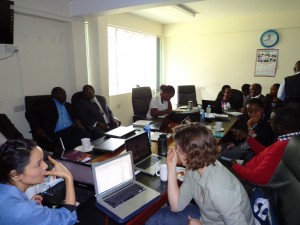Update from the Field: Kenya Hosts Stakeholders Meeting on CHW Planning

Things in Kenya are moving right along! Kenya’s Ministry of Health (MOH) has completed the first draft of their Community Health Workforce Roadmap. The One Million Community Health Workers Campaign (1mCHW Campaign) team is excited to support Kenya in moving forward with the process of designing community health worker (CHW) upgrades.
In their efforts to meet the health-related Millennium Development Goals (MDGs), Kenya has committed to improve health across the country by increasing access to health care through the use of CHWs – specifically, the Community Health Extension Workers (CHEWs) and Community Health Volunteers (CHVs) cadres. This commitment is driven by the proven effectiveness of community health personnel in addressing healthcare issues that are faced in rural settings.
But what is the Kenyan MOH planning on upgrading, exactly? At present, Kenya’s community health system is experiencing many challenges. Only half (54%) of the population currently has access to healthcare, as opposed to 85.2% in the United States. More importantly, most health facilities are located more than 5 kilometers away from the communities that need to use them. Geographical distance is one of the primary culprits for poor access to healthcare. In addition, socio-cultural barriers have led to low utilization of health facilities. Recognizing this, the Kenyan MOH aims to address these barriers through health services and promotion by CHWs.
The focus of the existing frontline health worker cadres in Kenya (the CHEWs and the CHVs) has been neonatal and maternal health. Unfortunately, these cadres lack the institutional support and resources necessary to be deployed into the communities. However, with increased investment and coordinated planning, CHEWs and CHVs will prove to be a powerful strategy for quickly improving Kenya’s health indicators—improving the effectiveness of these existing human resources is a
priority within Kenya’s Roadmap.
In a recent sta keholder meeting hosted by the Kenyan MOH, the 1mCHW Campaign came together with various partners involved in the Roadmap development process to review the details of the draft of the planning document. Dr. Salim Ali Hussein, head of the Community Health Services unit of Kenya’s Ministry of Health, led the MOH team, with participants from across the Ministry: the Malaria Control unit, the Neonatal, Child and Adolescent Health unit, and the Department of Family Health.
keholder meeting hosted by the Kenyan MOH, the 1mCHW Campaign came together with various partners involved in the Roadmap development process to review the details of the draft of the planning document. Dr. Salim Ali Hussein, head of the Community Health Services unit of Kenya’s Ministry of Health, led the MOH team, with participants from across the Ministry: the Malaria Control unit, the Neonatal, Child and Adolescent Health unit, and the Department of Family Health.
A diverse group of external stakeholders involved in community health also participated; organizations represented include: Liverpool Volunteer Counseling and Testing (LVCT), Amref Health Africa, Columbia Global Centers, World Vision International, Jhpiego, Japan International Cooperation Agency (JICA) and the Kenya Red Cross Society.
The 1mCHW Campaign applauds Kenya for maintaining its commitment to upgrading and expanding community health services through the ongoing Roadmap process. The Roadmap will be further edited to better include aspects training, costing, and monitoring and evaluation. There has also been vigorous discussion about the ideal target population, and what parts of the country the program should be implemented in in the early stages of program roll out.
Kenya is making tremendous strides towards completing its national community health upgrade strategy. Another country that provides an inspiring example is Ghana, which has now moved into an implementation preparation phase. With continued effort, and support from committed partners both domestic and external, Kenya should be on track to do the same – and ultimately to achieve the health-related MDGs and lay the foundation for universal health coverage.
Photo Credit: Ivy Mushamiri (1mCHW Campaign)

Comments are closed